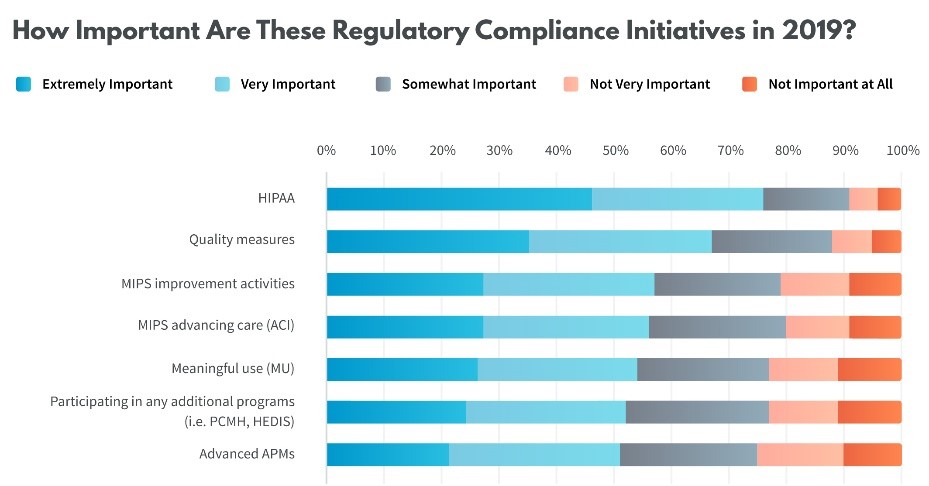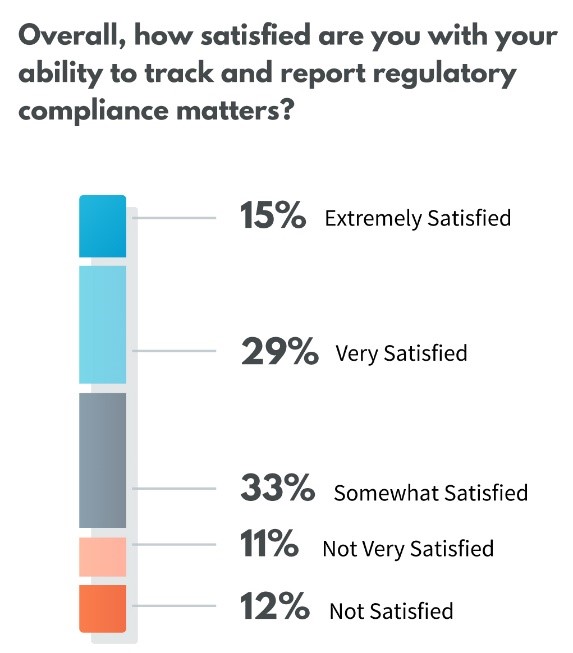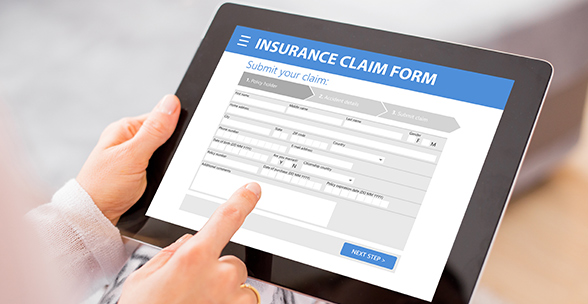What Independent Practices Think of Compliance Activities and How to Make Tracking Easier
Today, the need for regulatory compliance pervades every aspect of a healthcare practice, from privacy and security to reimbursement and profitability. According to Kareo’s 2019 State of the Independent Practice Report, independent practices take compliance very seriously even though regulatory compliance can be time-consuming and cumbersome. At the same time, many practices aren’t taking full advantage of the technology and systems that could make compliance easier and more seamless.

As the chart shows, independent practitioners have taken HIPAA to heart, with 76% rating HIPAA compliance as extremely or very important to their practice. Encouragingly for the future of independent practices, 67% consider quality measures as extremely or very important and over 50% of independent practices consider each of the compliance categories to be extremely or very important. This makes sense when you see that more than 50% of practices say, “Value-based payments are an increasing percentage of how I am reimbursed.”
A nearly equal number stated, “I participate in a Merit Based Incentive Payments System (MIPS) reimbursement program.” Of course, that still leaves nearly 50% of practices that don’t participate in MIPS. The non-participation may be partly due to independent practices not feeling as optimistic in their ability to record and report compliance matters.
In addition, over 70% of practices reported that managing quality measure incentives/disincentives is cumbersome to them. Significantly, newer providers (10 years or less in practice) are 61% more likely than those that have been in practice for 11 years or more to be extremely satisfied with their ability to track regulatory compliance. This may reflect the fact that they use newer technology and feel more comfortable with tracking.
Despite the potential monetary benefits and penalties – which for example in the 2018 performance period could be plus or minus $50,000 for a practice billing $1 million in Medicare Part B claims – many practices are not participating in MACRA. The reason for this is often because of the additional data entry and workload that tracking presents. As the 2019 State of the Independent Practice Report suggests, practices are not taking full advantage of technology in their pursuit of regulatory compliance.
For practices to participate in MIPS, of course, they must use the newest version of EHR – one that is 2015 certified. With each iteration of EHR technology, however, more and more software providers have fallen out of the race, leaving their customers with a fruitless investment and no way to participate in MIPS. In this arena, longer established practices may be more gun shy in that they adopted EHR several years ago and have often had to endure awkward and costly changes.
For practices that have 2015-certified EHR, and preferably one that is created and optimized for independent practitioners, electronic health records systems include a range of features that help reduce provider workload and improve delivery of patient care. Kareo, for example, has taken a user- friendly approach in enabling providers to comply with MACRA requirements. Clinicians using Kareo Clinical EHR are not asked to enter additional data for reporting on MIPS measures. Providers simply chart as usual, and Kareo’s automated reporting and tracking system keeps them on the path to earning the most in positive adjustments. The built-in reporting engine pulls patient data from encounters to support selected measures.
Clinicians can always know where they stand with their MIPS performance using the at-a-glance performance tracking dashboards. A setup wizard walks them through the steps for selecting measures. Afterward, the dashboards show progress scores on MIPS Quality and Advancing Care Information measures. Clinicians are also prompted with tips on how to improve scores.
Compliant EHRs should also include functionalities that meet 2015 certification criteria calling for:
viewing, downloading and transmitting health information to a third party
secure messaging
patient health information capture
transitions of care
application programming interfaces (APIs)

Fortunately, most practitioners recognize that while technology may be a pain in the workflow, it’s also the potential solution to many problems for independent practices. Sixty-nine percent of all providers agree that integrated technology solutions are needed to improve the efficiency and profitability of their practice. This fact goes double when it comes to regulatory compliance.
Kareo is committed to helping independent practices with meeting their MIPS compliance needs and schedules various webinars throughout the year on this important topic. Our next MIPS/MACRA is Wednesday, November 20 so if you haven’t signed up - save your seat now for Simple Steps to Avoid the 7 Percent Negative Payment Adjustment by registering here or a recording of the webinar will be available later in the week.




















